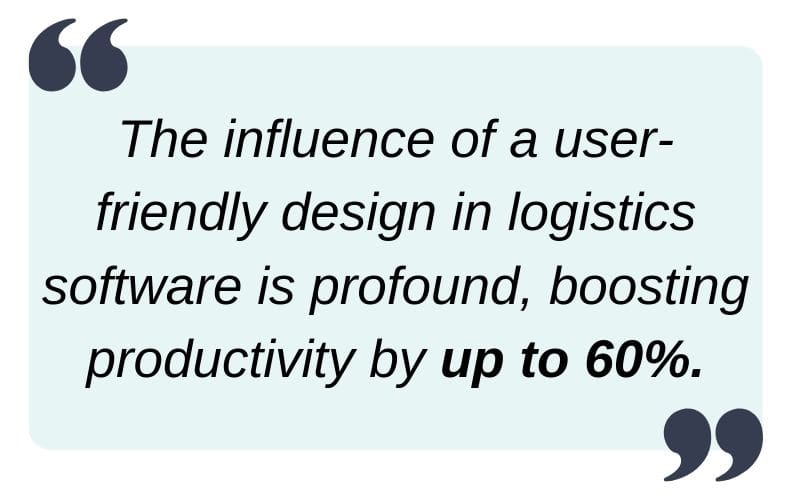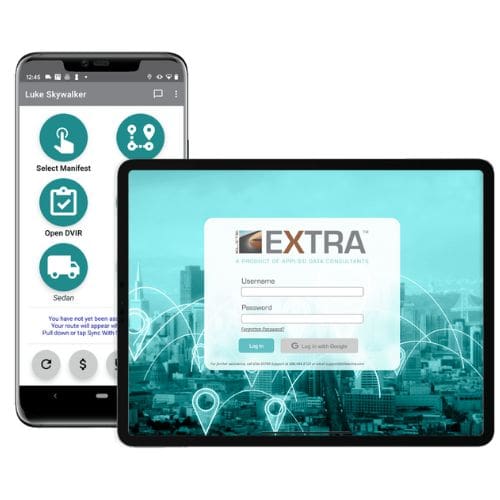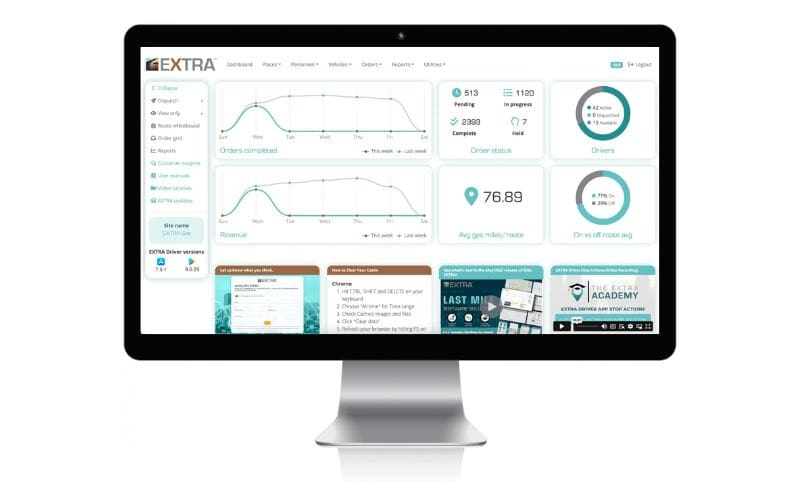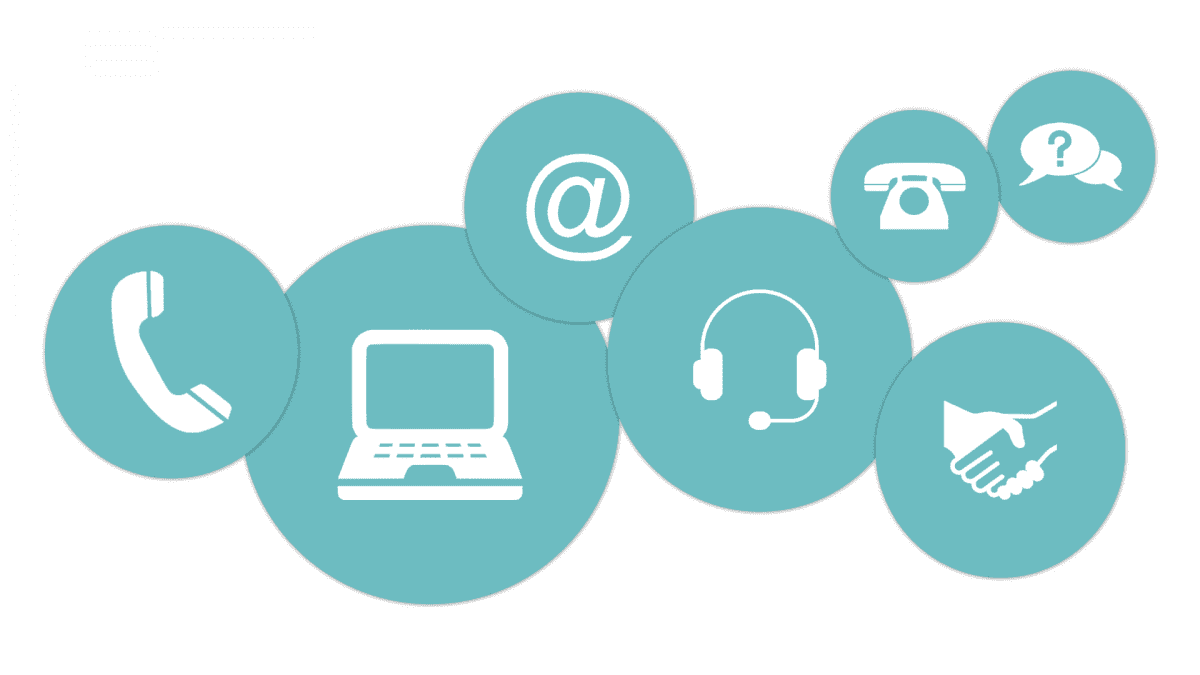
Today, a staggering 79% of companies with high-performing supply chains achieve revenue growth greater than the average within their industries. Unsurprisingly, a key component to their optimal performance is the logistics management software each of these companies use. These software solutions are far more than tools for just tracking and delivering goods; they are the backbone of operational optimization, efficiency enhancement, and a pretty significant catalyst for real business growth.
For business owners and logistics managers, it’s not just about selecting a software solution. It’s about strategically investing in a comprehensive system that matches your business goals and can easily adapt to its evolving needs. Today, we’re examining the top four considerations in choosing the right logistics management software.
User-Friendly Interface: The Power of Simplicity
The success and smooth functioning of logistics management operations are heavily dependent on the design and user-friendliness of the software interface they use. The interface’s design and ease of use are crucial in shaping the effectiveness of the company’s logistics operations. An interface that is thoughtfully crafted can simplify procedures, greatly reduce the likelihood of errors, and elevate the overall performance of operations within the logistics industry.
The Impact of User-Friendly Design

The influence of a user-friendly design in logistics software is profound, boosting productivity by up to 60%. This ease of navigation leads to quicker system adoption, fewer errors, and a more streamlined workflow. In logistics, where accuracy and timeliness are everything, reducing errors directly enhances service quality and customer satisfaction. Intuitive interfaces also contribute to higher employee satisfaction, keeping staff happy and allowing them to focus more on core tasks. A user-friendly design not only improves operations but also promotes a more engaged and effective workforce.
Essential Features of a User-Friendly Interface

- Drag-and-Drop Functionality: This feature is important in simplifying complex scheduling and routing tasks. It allows users to visually manage logistics operations, making adjustments and planning more intuitive and far less time-consuming. One case study highlighted that drag-and-drop functionality in logistics software could reduce scheduling time by up to 30%.
- Customizable Views: Every logistics operation is unique, and customizable views cater to this diversity. They allow users to tailor the interface to their specific needs, focusing on the most relevant data and functions. They align the software’s capabilities with the user’s specific tasks and priorities which can be a real boost in productivity.
- Mobile Compatibility: Today, mobile compatibility is a must-have. Mobile compatibility ensures that logistics managers and team members can access critical information and functionalities anytime, anywhere, which is vital for timely and effective logistics operations.
Scalability and Integration: Growing with Your Business
The scalability of your management software is vital to the long-term success and adaptability of your business. Scalability is a real necessity for businesses aiming to thrive in an ever-evolving market.
Addressing Current and Future Business Needs
Selecting logistics management software requires a keen focus on both present operational needs and future growth plans. Begin by evaluating your current logistics challenges like inventory management, route planning, or customer communication. The ideal software should offer immediate solutions to these issues, boosting your current operations.
Looking forward, consider your business’s growth trajectory. Whether it’s expanding into new markets, diversifying product lines, or scaling delivery operations, your software should be capable of supporting these future endeavors. Key features for future growth might include multi-location management, a variety of shipping options, and advanced analytics for market insights.
The balance between flexibility and stability is crucial. Your chosen software must be robust enough to handle current operations while adaptable to future changes and scalable in terms of users, transaction volumes, or technology integration. Also, putting data analytics within the software to work can aid in strategic planning, allowing you to forecast trends and prepare for future demands.
The Essence of Scalability
As your business expands, whether in terms of volume, geographic reach, or complexity of operations, your software should be capable of handling these increased demands efficiently. Scalable logistics software can accommodate growth without the need for significant overhauls or investments in new systems, thus providing a sustainable and cost-effective solution.
Key Features of Scalable Software
- Modular Design: This design approach enables the seamless addition of new features or modules in response to your business’s growth. As your operational needs evolve, the modular design of the software allows for easy integration of new functionalities, ensuring that your system remains up-to-date and aligned with your expanding business requirements.
- Cloud-Based Infrastructure: This feature provides exceptional flexibility and scalability, crucial for modern logistics operations, without the burden of physical hardware upgrades. By leveraging cloud technology, the software can easily accommodate increasing data volumes and additional users as your business grows. This infrastructure ensures that your logistics management system is always accessible, up-to-date, and capable of scaling up or down based on your current needs, all while avoiding the costs and complexities associated with traditional hardware-based systems.
- Data Handling Capabilities: As your business expands, so does the volume of data it generates and requires for decision-making. Efficient data handling capabilities in logistics software are essential to manage this surge in information. These capabilities ensure that large datasets are processed, analyzed, and stored efficiently, facilitating quick access and reliable data management.
The Importance of Seamless Integration
Integration capability is another must-have aspect of logistics management software. The ability to integrate seamlessly with existing systems like Enterprise Resource Planning (ERP) or Customer Relationship Management (CRM) systems is vital for maintaining a streamlined operation.
Seamless integration ensures that different systems communicate effectively, leading to a unified workflow. This harmonious interaction minimizes disruptions in operations and keeps everything running smoothly by eliminating the need for manual data entry and the errors that come with it.
Benefits of Effective Integration

- Data Accuracy and Visibility: Integrated logistics systems are vital in offering real-time data accuracy and visibility, which is essential across various business functions. This integration ensures that data from different departments is synchronized and updated in real time, reducing the likelihood of discrepancies and errors.
- Improved Decision-Making: The integration of various systems within logistics software provides decision-makers with comprehensive and consolidated data. This holistic view of operations enables more informed and strategic decision-making. Leaders can analyze trends, assess performance metrics, and make data-driven decisions that align with the company’s objectives.
- Enhanced Customer Experience: Customers benefit from more accurate and timely updates on their shipments, leading to increased transparency and trust. Integrated communication tools also allow for quicker response times to customer inquiries and issues, further enhancing customer satisfaction and loyalty.
Functionality and Customization: Tailoring to Your Needs
The functionality and customization of management software is an important part of aligning technology with specific business needs. Each business has its unique operational requirements, and logistics software should be flexible enough to adapt to these distinct needs.
Essential Functionalities for Diverse Needs
The core functionalities of logistics software can vary quite a bit depending on the nature of the business. For instance, a retail business might prioritize inventory management and order tracking, while a manufacturing company may focus more on supply chain management and raw material tracking.
- Real-Time Tracking: Many logistics providers consider real-time tracking as the most valuable feature of logistics software. This feature allows businesses to monitor shipments in real time, providing transparency and improving customer satisfaction.
- Reporting Capabilities: Effective reporting tools are essential for data-driven decision-making. 31% of supply chain managers utilize predictive and prescriptive analytics to enhance the efficiency of their processes. Advanced reporting capabilities in logistics software can help businesses analyze trends, optimize routes, and reduce costs.
- Inventory Management: Efficient inventory management is crucial for minimizing holding costs and ensuring timely order fulfillment.
The Power of Customization
Customization in logistics software isn’t just about adding more features. It should be about making sure that the software aligns perfectly with the unique processes and workflows of the individual business.
- Personalized Reporting: Customizable reporting allows businesses to focus on metrics that matter most to them, whether it’s delivery times, customer satisfaction scores, or cost per delivery.
- Workflow Automation: Custom automation features can streamline operations, reducing manual effort and minimizing the risk of errors.
- Integration Capabilities: The ability to integrate with other systems, such as CRM or ERP, allows for a seamless flow of information across different business functions.
Cost and Return on Investment: Maximizing Value in Logistics Software
Understanding and managing the costs associated with software is as crucial as leveraging its benefits. The total cost of ownership (TCO) and the return on investment (ROI) are key metrics that businesses must evaluate to ensure they are making a cost-effective decision.
Understanding Total Cost of Ownership
The TCO of logistics software extends beyond the initial purchase price. It encompasses various other expenses that can impact your budget over time.
- Implementation Costs: These can vary widely depending on the complexity of the software and the specific needs of your business. According to a report by Panorama Consulting Solutions, the average ERP implementation cost is about 4% of annual revenue.
- Training Costs: Proper training is essential for maximizing the software’s potential. Training expenses can account for up to 20% of the total implementation cost, as per the same report.
- Maintenance and Support Costs: Ongoing maintenance and support are critical for the smooth operation of the software.

Pricing Models and Hidden Costs
Different logistics software providers offer various pricing models, each with its own set of potential hidden costs.
- Subscription vs. One-Time Purchase: Subscription models may seem more affordable initially but can become more expensive in the long run. Conversely, a one-time purchase might have higher upfront costs but lower long-term expenses.
- Hidden Costs: Be vigilant about hidden costs like support fees, updates, or additional modules.
Evaluating Expected ROI
Evaluating the expected ROI is essential in understanding the value that logistics software brings to your business, which can be quantified in financial terms. The ROI encompasses several benefits, including time savings, efficiency gains, and increased revenue potential. With efficient logistics software, the reduction in manual tasks can lead to significant time savings, which, as noted in logistics automation studies, can decrease operational costs by up to 15%. The improvement in overall efficiency often results in cost savings, while enhanced customer service and delivery efficiency contribute to increased customer retention and acquisition, boosting revenue potential.
Making the Strategic Choice: Your Path to Logistics Excellence
The decision to choose the right logistics management software isn’t just a quick decision. It’s a strategic move that can define the trajectory of your business’s success. Logistics efficiency directly correlates with customer satisfaction and business growth, so the importance of this decision is huge. By meticulously considering these four critical aspects – a user-friendly interface, scalability and integration, functionality and customization, and cost and ROI – you’re not just choosing a software solution. You’re investing in a tool that will grow with your business, adapt to its changing needs, and continuously drive operational excellence.
In this journey towards operational optimization and business growth, Elite EXTRA stands as a beacon of innovation and reliability in logistics management software. Our solutions are comprehensive and tailored to meet the unique demands of your business. With Elite EXTRA, you gain a partner who understands the intricacies of logistics management and is committed to providing software that’s as dynamic and adaptable as the industry itself.
Embrace the Future of Logistics with Elite EXTRA
Are you ready to transform your logistics operations? To elevate your business with a software solution that’s designed for today’s challenges and tomorrow’s opportunities? Elite EXTRA offers a suite of customizable, scalable, and user-friendly logistics management tools that are crafted to enhance efficiency, reduce costs, and drive growth.
Don’t let logistics be the bottleneck of your business success. Join our satisfied customers who have revolutionized their logistics operations with Elite EXTRA. Contact us today to discover how our logistics management software can be the catalyst for your business’s success and growth.
Sources
https://www.ganttic.com/blog/case-study-dribia
https://www.mhi.org/publications/report
https://www.panorama-consulting.com/wp-content/uploads/2022/08/2017-ERP-Report.pdf
https://www.mckinsey.com/industries/travel-logistics-and-infrastructure/our-insights/automation-in-logistics-big-opportunity-bigger-uncertainty







